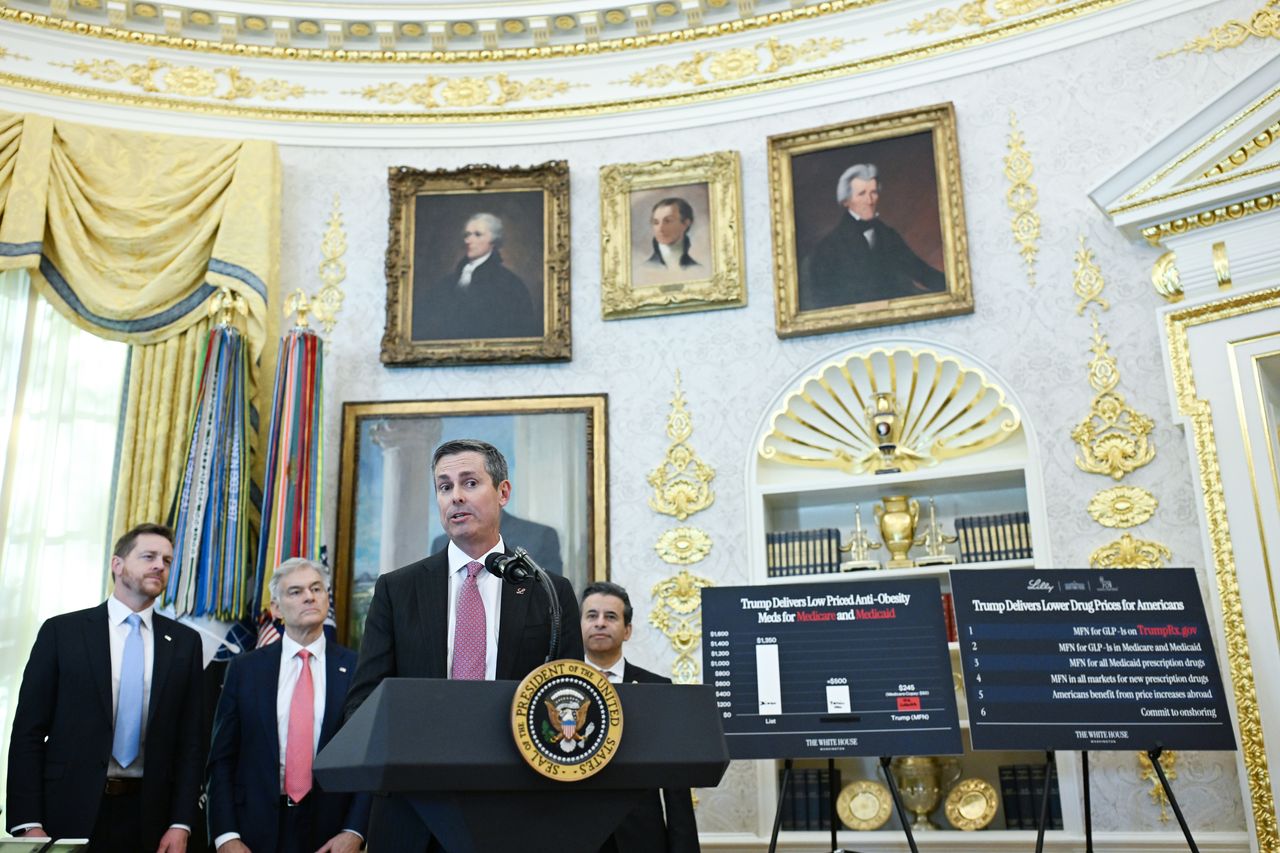| |  | | | | |  | By Megan R. Wilson | - Drug pricing pact: The Trump administration struck deals with Eli Lilly and Novo Nordisk to cut prices on blockbuster GLP-1 weight-loss drugs for Medicare, Medicaid and patients willing to pay cash for them — expanding access while aiming to reduce long-term health costs.
- Telehealth rollback: More than 450 groups are urging lawmakers to extend Medicare’s pandemic-era virtual care coverage that expired at the end of September. It has left providers scrambling, patients facing canceled or delayed visits, and some clinicians absorbing financial risk to keep care going.
Good afternoon, and welcome to the Health Brief. It’s been a crazy day, and we’ve got lots to unpack — from former Democratic leader Nancy Pelosi’s retirement announcement to a sweeping drug pricing deal. I’m going through the top-line details today, but there will be more to discuss moving forward. Let me know: What’s your reaction to the deal and what are you hearing about the impacts to the industry and health system overall? Also, who will be the next drugmaker to make a deal with the administration? Send all your best health policy intel, tips and scoops to megan.wilson@washpost.com or message me on Signal at megan.434. This newsletter is published by WP Intelligence, The Washington Post’s subscription service for professionals that provides business, policy and thought leaders with actionable insights. WP Intelligence operates independently from the Washington Post newsroom. Learn more about WP Intelligence. |  | | Dave Ricks, CEO of Eli Lilly, at a White House briefing with top Trump administration officials announcing a drug pricing deal. (Matt McClain/The Washington Post) | | | |  | The Lead Brief | The Trump administration has negotiated deals with pharma giants Eli Lilly and Novo Nordisk to massively slash the prices of their blockbuster GLP-1 weight loss drugs in exchange for expanded access to government health programs they’ve largely been unable to tap. Medicare and Medicaid — in addition to commercial insurance plans — offer spotty coverage for the drugs, in part because of the high price tags, which can reach more than $1,000 per month without discounts or rebates. Medicare hasn’t been able to cover the drugs to treat obesity, which makes this announcement particularly significant. In the Washington Post newsroom, Dan Diamond, Daniel Gilbert and Paige Winfield Cunningham have the full story on the announcement. → The current cost for cash-pay patients: Eli Lilly offers the 2.5mg starter dose of its GLP-1 medication, Zepbound, directly to consumers at $349. Higher doses cost $499 per month, the same price Novo Nordisk charges for its GLP-1 competitor, Wegovy, for people buying the medicines directly from them. The deal surrounding the anti-obesity drugs has several elements — and there’s a lot of different numbers — so let’s go through it: - $149: The cost of a starter dose of Eli Lilly’s yet-to-be-approved GLP-1 pill called orforglipron, should regulators give it the green light. The Food and Drug Administration has agreed to give the medicine expedited review in return for the lower price.
- $245: The price Medicare will pay for injectable GLP-1s — including Wegovy and Zepbound — used to treat both diabetes and obesity. It’s also the price being offered to state Medicaid plans for certain patients under an upcoming pilot program overseen by the Centers for Medicare and Medicaid Services that begins in 2027.
- 2026: The new pricing for Medicare will kick in by July of next year, according to administration officials. Under the agreement, the beneficiaries who qualify will only have a $50 co-pay for the drugs.
- 10 percent: The estimated number of Medicare beneficiaries eligible to receive the lower-priced medicine, according to administration officials. The eligibility criteria is tied to a person’s BMI — starting at a BMI of 27 — and preexisting conditions such as prediabetes, cardiovascular disease and advanced kidney disease. (The same eligibility criteria will apply to the Medicaid pilot program.)
- 69 million: The number of people currently on Medicare.
- $350: The average monthly cost of Wegovy and Zepbound for people who want to pay cash for the medicines across the various doses. In a release, Eli Lilly said that cash-pay patients would be getting a $50 discount off Zepbound’s current prices. However, Trump administration officials said they’ve secured agreements with the companies to lower the monthly price of their products to $245 over the next two years.
Administration officials argue that the expansion in coverage will ultimately save the government money by preventing chronic diseases and making people healthier, thereby lowering other health care costs overall. → Novo Nordisk said in an announcement that it’s expecting a “direct, negative low single-digit impact on global sales growth in 2026” due to the deal. Translation: There will be a small dip in overall sales revenue next year. A reminder that the company is currently trying to cement its place in the weight loss medication market, engaged in a bidding war with rival pharma giant Pfizer over a biotech start-up developing anti-obesity medications. Eli Lilly CEO Dave Ricks declined to speculate on the company’s financial outlook due to the pricing shift — but conceded that the increase in the number of people likely able to obtain the medications would help offset losses. Other drugs: Eli Lilly said it will also offer Emgality, its migraine medication, and diabetes drug Trulicity directly to patients at discounts of 50 percent to 60 percent off. Trulicity costs about $987 without insurance, which would equal about $395 per month after a 60 percent discount. Emgality would cost about $348 after the 60 percent discount, as its price is roughly $869 without insurance. As part of the deal, Eli Lilly is getting a three-year reprieve from tariffs. → The moves are part of President Donald Trump’s push for pharma giants to lower their drug costs in line with what other wealthy countries pay, known as “Most Favored Nation” pricing. Pfizer, AstraZeneca and EMD Serono have each made their own drug pricing pacts with the administration. What’s next: Ozempic and Wegovy, both made by Novo Nordisk, were also selected for Medicare negotiation under the Inflation Reduction Act passed during the Biden administration. The administration is set to announce negotiated prices for the 15 drugs under negotiation in the coming weeks. (Eli Lilly’s drugs are too new to qualify for negotiation.) Congressional Democrats are arguing today that the Biden-era law paved the way for today’s announcement. “Democrats created the legal authority to negotiate down the Medicare price of GLP-1 medications like Ozempic and Wegovy without a single Republican vote,” said Rep. Frank Pallone Jr. (New Jersey), the top Democrat on the House Energy and Commerce Committee, in a statement. | | | |  | Tech Check Up | Doctors’ offices, telemedicine platforms and hospitals are urging Congress to quickly reinstate Medicare’s pandemic-era telehealth coverage after it expired at the end of September, cutting off expanded reimbursement for virtual visits for older adults. The lapse means many Medicare patients can no longer see their providers from home. Providers have been scrambling to adjust amid widespread confusion and concern among millions of patients who had come to rely on virtual care. More than 450 provider groups, health systems, telehealth companies and patient organizations sent a letter to congressional leaders this week calling for a long-term fix, warning that temporary stopgaps are no longer sustainable. “This cycle of temporary fixes has resulted in patients and providers facing continued disruptions in care. Providers are faced with decisions between providing the necessary care for their patients and cutting access to clinicians and services they are providing virtually,” the letter reads. The measures have had broad bipartisan support but have become one of the casualties of the government shutdown. The crisis underscores how dependent the health system became on telehealth since the pandemic and how fragile that access remains without permanent policy in place. Providers say the change is already disrupting care. Some have paused or canceled remote visits for Medicare beneficiaries. Clinicians warn that the rollback could especially hurt older adults with chronic conditions, mobility challenges or limited transportation. “The lapse has created substantial confusion across practices, including for patients, providers, practice administrators and even health plans, including Medicare Advantage plans,” Mara McDermott, who leads the group Accountable for Health, which signed onto the letter. She tells me that some providers are continuing virtual appointments and absorbing the financial risk “because they don’t have the workforce in place to cover those visits in person.” I’m also hearing that some Medicare Advantage plans are continuing to allow coverage, assuming Congress will enact a fix. Plans are allowed some flexibility with coverage, due to existing regulations, I’m told. Kivo Health, a fully virtual platform that treats patients with a type of lung diseases called COPD, also signed onto the letter. It has continued taking patients despite the uncertainty. Nearly all of its patients are covered by Medicare, its CEO Victor Sadauskas told me. “We've continued to provide care during the shutdown, but the lapse in reimbursement creates stress and unnecessary uncertainty for seniors who are already suffering from chronic disease. They don't know if Medicare will cover their therapy,” Sadauskas said. “Some patients have had to make the difficult decision to delay doctor recommended care until there's more certainty around Medicare reimbursement.” → This delay, he said, could have ripple effects for both patients and the overall system. “Delayed care means they're more likely to have worsening symptoms, end up in the ER with an exacerbation, or even end up hospitalized. This ends up costing Medicare more money in the long run, while putting seniors in harm's way,” he said. | | | |  | Health on the Hill | Former speaker Nancy Pelosi (D-California) announced she will be retiring at the end of her current term after nearly 40 years in Congress. Read the write-up from The Post’s Paul Kaine on Pelosi’s legacy. Pelosi, who led Democrats in the House for two decades, helped to shepherd the Affordable Care Act in 2010 that revamped the health care system to passage, legislation that included extending coverage protections to patients with preexisting conditions. Opponents argue the law is flawed, but Republicans have yet to come up with a plan to replace it. From the archives: In a retrospective published by The Post when Pelosi stepped down as the House’s Democratic leader in 2023, she reflected on the passage of the Affordable Care Act’s, calling it “the biggest thing that I’ve ever done in Congress.” Per Paul and Melina Mara: It is perhaps the piece of legislation she is most closely tied to, muscling it over the finish line. But it also is indicative of a larger theme to Pelosi’s career: winning the vote. → The San Francisco Chronicle has a roundup of people expected to make a run for her seat. | | | | | | | | | | | | |